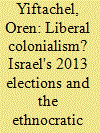| Srl | Item |
| 1 |
ID:
128057


|
|
|
|
|
| Publication |
2013.
|
| Summary/Abstract |
Israel's 2013 Knesset elections, in which the incumbent ruling party was returned to power for the first time in a quarter-century, were noteworthy in several respects. The basic divisions of Israeli politics into geopolitical and socioeconomic blocs were unchanged, only small electoral shifts being registered. On the other hand, as this article shows, Prime Minister Benjamin Netanyahu barely achieved an electoral victory despite his overwhelming preponderance in public-opinion polls. Due to the rise of the new, personality-driven Yesh 'Atid party and the latter's unlikely alliance with the settler-based Jewish Home, which together garnered as many Knesset seats as the winning Likud-Yisrael Beitenu list, for the first time in decades Ultra-Orthodox parties were excluded from the winning governing coalitions for the first time in decades. The elections were marked by the near-invisibility of the Palestinian issue and Palestinian citizens of Israel. The article concludes that the continuing governing consensus in favor of "liberal colonialism" is unsustainable, although exploiting the "cracks" in that consensus is difficult and unlikely in the short term.
|
|
|
|
|
|
|
|
|
|
|
|
|
|
|
|
| 2 |
ID:
091799


|
|
|
|
|
| Publication |
2009.
|
| Summary/Abstract |
Focusing primarily on Israeli voter attitudes with respect to the Zionist-Palestinian conflict, this paper argues that the results of the 2009 elections highlight the structural entanglement of Israeli politics within a colonialist process of "creeping apartheid" not only in the West Bank but in Israel proper. The elections also demonstrated the continuing relevance of identity and class politics among Israeli voters and the trend among culturally and economically marginalized groups to support the colonialist agendas set mainly by the settlers, the military, and parts of the globalizing economic elites. In parallel, election results among Palestinians in Israel reflect their growing alienation from a political system that structurally excludes them from political influence.
|
|
|
|
|
|
|
|
|
|
|
|
|
|
|
|